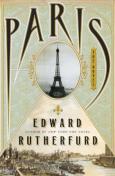BKMT READING GUIDES
Paris: The Novel
by Edward Rutherfurd
Hardcover : 832 pages
5 clubs reading this now
8 members have read this book
Internationally bestselling author Edward Rutherfurd has enchanted millions of readers with his sweeping, multigenerational dramas that illuminate the great achievements and travails ...
Introduction
From the grand master of the historical novel comes a dazzling, epic portrait of the City of Light
Internationally bestselling author Edward Rutherfurd has enchanted millions of readers with his sweeping, multigenerational dramas that illuminate the great achievements and travails throughout history. In this breathtaking saga of love, war, art, and intrigue, Rutherfurd has set his sights on the most magnificent city in the world: Paris.
Moving back and forth in time across centuries, the story unfolds through intimate and vivid tales of self-discovery, divided loyalties , passion, and long-kept secrets of characters both fictional and real, all set against the backdrop of the glorious city—from the building of Notre Dame to the dangerous machinations of Cardinal Richlieu; from the glittering court of Versailles to the violence of the French Revolution and the Paris Commune; from the hedonism of the Belle Époque, the heyday of the impressionists, to the tragedy of the First World War; from the 1920s when the writers of the Lost Generation could be found drinking at Les Deux Magots to the Nazi occupation, the heroic efforts of the French Resistance, and the 1968 student revolt.
With his unrivaled blend of impeccable research and narrative verve, Rutherfurd weaves an extraordinary narrative tapestry that captures all the glory of Paris. More richly detailed, more thrilling, and more romantic then anything Rutherfurd has written before, Paris: The Novel wonderfully illuminates hundreds of years in the City of Light and Love and brings the sights, scents, and tastes of Paris to sumptuous life.
Editorial Review
Essay by Edward Rutherfurd
I was eight when I fell in love with Paris. Though my family was British, we had many French cousins, and that year we all went over to Paris to see them.
There was the magical drive around floodlit Paris; the river trip, the walk down the Champs-Elysees. The smell of Gauloises cigarettes--now gone--and French coffee, the taste of real French cooking, a far cry from the food I knew. I took pictures from the top of the Eiffel Tower, and gazed in rapture at the Napoleonic army of toy soldiers in Les Invalides. And then there was the sound of my cousins speaking French--charming, sensuous, mysterious.
But it was something unexpected that impressed me most.
My French cousin Isabelle was driving me and my father's elderly aunt. By mistake, she made an illegal turn. The police pounced. Isabelle apologized. The policeman was stony-faced. Then Isabelle had an inspiration.
"You see, Monsieur, I was taking my aunt from England for a drive," she explained.
The policeman bent down, looked at the little old lady on the back seat, stood at attention and saluted. "Passez, Madame," he said gallantly.
We've all encountered occasional rudeness in France, but throw yourself on a French person's mercy, and their sense of chivalry usually kicks in. That's the special charm of France.
I stayed with my cousins often after that. One Parisian family lived just up the street from Proust's childhood home, and only yards from where the Statue of Liberty was constructed. Others had an old house in Fontainebleau, with a veranda straight out of a Manet painting, and family stories that went back to Napoleonic times. Others lived near the Bastille, or in Hemingway's Montparnasse, or in the Latin Quarter--wonderfully convenient when, as a teenager, I needed to sneak into the revolutionary riots in 1968. All these places found their way into my novel.
The son of a laborer taught me street-fighting--my background for the Gascon family. I knew an old monarchist priest who still held the French kings sacred; an aristocrat who'd known Chagall, and a virulent Marxist student. I lived with professional families whose shared memories went back to the days of the Belle Epoque and beyond. These were the sources of my characters and stories.
And as a young man, I also fell in love in Paris, with an older woman, which left me with memories of Neuilly when the horse chestnuts are in blossom, and of walks in the Parisian dawn, and an old house with parquet floors that creaked, and the smell of fresh croissants and cafe au lait in the morning.
But if Marcel Proust found the past brought vividly back to life by the taste of a madeleine, I too have a taste and smell to share; of eating frogs legs at the age of eight, and being sick afterwards . . . I still can't bear the smell. I'll stick to the croissants and cafe au lait!
Discussion Questions
No discussion questions at this time.Book Club Recommendations
Recommended to book clubs by 0 of 0 members.
Book Club HQ to over 90,000+ book clubs and ready to welcome yours.
Get free weekly updates on top club picks, book giveaways, author events and more








